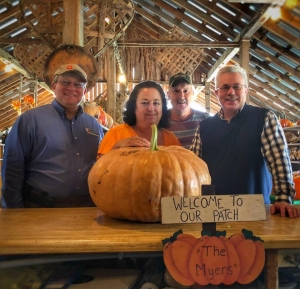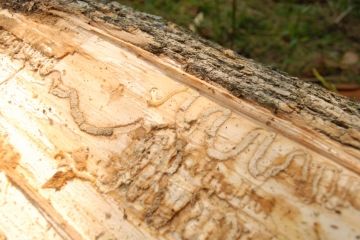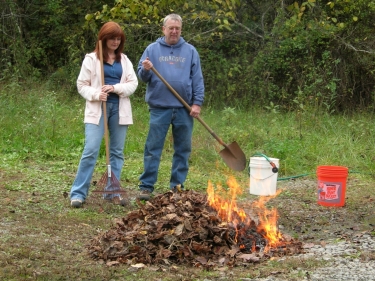Rural Routes - Oct. 2018

In This Issue

Commissioner Jai Templeton: Building Markets at Home, Promoting Trade Abroad
As Governor Haslam's administration comes to an end, I'm extremely pleased with the great work and devoted efforts that have come from our state government. During my time with the Tennessee Department of Agriculture, one focus I'm particularly proud of is our work to assist and promote Tennessee's food, farm, and forest businesses.
Even if you have the best innovation or idea, the thought of having an international customer base can be daunting. By reorganizing our Agricultural Advancement Division, we've been able to expand our focus on assisting Tennessee businesses to include international trade and exports.
In September, five Tennessee food and beverage businesses made lasting connections and discussed future trade deals during an outbound trade mission to Canada. Last week, we were excited to help host the Southern Forest Products Export Conference in Memphis, which showcased the importance of southern forest products and the industry that produces them. We will participate in more internationally-focused events in 2019, and we are preparing to further develop exporting opportunities for our horticulture sector.
While we're promoting trade abroad, we will always make sure we focus on strengthening local markets. Our Agriculture Enterprise Fund (AEF) program started roughly one year ago with a primary focus to facilitate agricultural development in at-risk and distressed counties in Tennessee. We’ve already awarded more than $1.1 million through the AEF, and these investments will lead to a total economic impact of more than $25 million throughout the state. Furthermore, many farmers and producers have utilized our Tennessee Agriculture Enhancement Program (TAEP). The program has paid more than $168 million to assist 57,543 projects since it was established in 2005.
Supporting the marketplace and processing facilities that farmers and foresters use can be just as important as assisting with on-farm projects. We understand the need for additional USDA-inspected meat processing capacity, and are working diligently with current facilities on expansion projects as well as assisting those interested in building new facilities. Producers benefit from having multiple avenues to market and sell their products, so I’m proud that we have assisted more than 500 farmers market projects across the state by awarding more than $2.5 million through TAEP.
Tennessee farmers know how to make the most of what they've got. Many have always had to work with limited resources. I'm proud of our team for providing assistance and support to ensure that our agriculture and forestry industry remains strong and profitable for generations to come.

Additional Tennessee Counties Quarantined for Emerald Ash Borer
Three more Tennessee counties have been quarantined for Emerald Ash Borer (EAB) after detection of the forest-devastating insect, bringing the total number of Tennessee counties under a state and federal EAB quarantine to 62.
Cheatham, Giles, and Maury counties have been added to the list of areas restricted for the movement of firewood, ash nursery stock, ash timber, and other material that can spread EAB. The tree-killing beetle was recently found in these three counties through the United States Department of Agriculture’s EAB detection program
“Emerald Ash Borer is a very serious invasive insect that has the potential to severely impact the health and lifespan of all ash trees in Tennessee,” State Forester David Arnold said. “Slowing the spread is our best line of defense, so we ask those in quarantined counties to be cautious with moving firewood, ash logs, and other ash material.”
Since being introduced to the U.S. in the 1990s, the destructive insect has killed millions of ash trees and spread to 35 states. Citizens are encouraged to report any symptomatic ash trees to the Tennessee Department of Agriculture (TDA) and follow these recommendations:
- Don’t transport firewood, even within the state.
- Use firewood from local sources near where you’re going to burn it or purchase certified heat-treated firewood.
- If you have moved firewood, burn all of it before leaving your campsite.
- Watch for signs of infestation in your ash trees. If you suspect your ash tree could be infested with EAB, click here or call TDA’s Consumer and Industry Services Division at 1-800-628-2631.
TDA’s Division of Forestry estimates that five million urban ash trees in Tennessee are potentially at risk from EAB. The risk represents an estimated value loss of $2 billion. There are an estimated 261 million ash trees on Tennessee timberland, which are potentially valued as high as $9 billion.
For more information about EAB and other destructive forest pests in Tennessee, visit www.protecttnforests.org. Follow ProtectTNForests on Facebook, Instagram, and Twitter for updates on the harmful impacts insects and diseases have on our trees, where pests are found, and what landowners can do to help protect their trees.

Support Local Dairies With New Tennessee Milk Logo
Consumers now have a way to know that their milk comes from Tennessee dairy farms with the new official Tennessee Milk logo.
Milk labeled as Tennessee Milk must be entirely sourced, processed, and bottled in Tennessee. The program is administered by the Tennessee Department of Agriculture (TDA).
“This logo allows consumers the opportunity to support Tennessee dairy farmers, who are facing challenging times right now,” Agriculture Commissioner Jai Templeton said. “We appreciate the Tennessee Dairy Producers Association for supporting the enabling legislation, assisting TDA on the development of the logo, and promoting the program to producers and processors.”
Sunrise Dairy in Crossville and the Middle Tennessee State University (MTSU) Creamery are currently using the Tennessee Milk logo. Weigel’s, Hatcher Family Dairy, and G & G Family Dairy will soon follow.
“Milk has been an important part of our heritage for over 85 years,” Weigel’s chairman Bill Weigel said. “This new milk logo represents the pride and dedication of our Tennessee farmers. Weigel’s is proud to announce that it will only process and distribute milk from East Tennessee dairy farms.”
The 110th General Assembly passed legislation enacting the Tennessee Milk logo. Sen. Frank Niceley and Rep. David Hawk sponsored the bill. TDA will continue working with processors to increase Tennessee Milk participation, giving consumers a broader opportunity to support local farmers.
“Middle Tennessee State University is proud to be one of the first producer/processors to participate in the new Tennessee Milk program,” MTSU Director and Professor of Animal Science Dr. Jessica Carter said. “Being part of this program will allow us to brand our milk as a locally-produced product and enable consumers to confidently purchase dairy products from Tennessee farmers. Our freshly bottled MTSU milk will proudly display the new Tennessee Milk logo to help promote Tennessee’s dairy industry.”
“We believe it’s in everyone’s best interest to support the dairy industry, which is a vital part of our agricultural economy,” Commissioner Templeton said. “We encourage consumers to look for and ask for locally produced milk at their local store. Every little bit helps.”
Tennessee has 226 dairy farms and approximately 33,500 dairy cows, goats, and sheep. For more information about the Tennessee Milk logo, contact Danny Sutton at danny.sutton@tn.gov.

State Forester Urges Citizens to Practice Safe Debris Burning
The Tennessee Department of Agriculture Division of Forestry observed National Fire Prevention Week (Oct. 7-13) by reminding citizens to follow simple safety practices to prevent wildfires. The official start of wildfire season in Tennessee was Oct. 15.
“With the recent and forecasted rain, we expect favorable conditions for safe debris burning over the next couple of months,” State Forester David Arnold said. “However, we shouldn’t let our guard down. We encourage Tennesseans to remain vigilant and practice safe debris burning to prevent wildfires.”
Obtaining a burn permit is free, fast, and simple. If you are burning a leaf or brush pile that is smaller than 8 feet by 8 feet in size, our online system provides a quick and efficient way to apply. For a larger burn, call your local Division of Forestry burn permit phone number Mon. through Fri., 8 a.m. - 4:30 p.m. The online system and burn permit phone numbers can be found here.
More than 300,000 permits are issued each year, and they are only issued when conditions are conducive to safe burning. If you live inside city limits, there may be additional restrictions. Check with your municipality before you burn.
For a list of materials that may not be burned, check the Tennessee Department of Environment and Conservation's open burning guidelines here.
Burning without a permit is a Class C misdemeanor punishable by up to 30 days in jail and/or a fine. Wildfires caused by arson are a class C felony punishable by 3 to 15 years in prison and up to $10,000 in fines. Anyone with information about suspected arson activity should call the state Fire Marshal’s Arson Hotline at 1-800-762-3017. The hotline is answered 24 hours a day, and you may remain anonymous when providing information. Cash awards are offered for information leading to an arrest or conviction. To report illegal burning, please call 1-888-891-TDEC.
Click here for additional tips to burn safely and to protect your community.
The Division of Forestry promotes the wise use of forest resources by assisting landowners, fighting wildfires, providing quality seedlings, monitoring insects and diseases, improving urban forests, managing state forests, protecting water quality, and collecting forest inventory data. The Division also works to promote primary and secondary forest industries to stimulate the state’s economy. Visit our website for more information.

Maxwell Receives National Award for Outstanding Contributions
The National Association of State Departments of Agriculture (NASDA) has honored Larry Maxwell, Chief Administrative Officer and Assistant Commissioner at the Tennessee Department of Agriculture (TDA), for his years of service to Tennesseans and dedication to agriculture.
Maxwell received the Douglass-Irvin Administration Award, which recognizes an individual for outstanding contributions within a state agency resulting in improved efficiency and impact.
“Larry Maxwell is highly respected throughout state government and has proven himself invaluable to every commissioner he has served,” Agriculture Commissioner Jai Templeton said. “Above all, Larry is loyal, dedicated, and has always gone above and beyond the call of duty to get the job done. We’re fortunate to have him as a leader, an advisor, and a friend.”
Among his major achievements and duties is the management of the Tennessee Agricultural Enhancement Program, which has provided more than $168 million in funding to Tennessee farmers and rural communities since the program’s inception. He has effectively managed a $20 million investment to replace the department’s entire heavy firefighting fleet while building reserves for the maintenance of and eventual replacement of that equipment.
Maxwell was honored at the NASDA annual meeting earlier this year.
“I am grateful to have been considered for this award,” Maxwell said. “I hope the work we’ve accomplished in my time at the Tennessee Department of Agriculture has made a positive impact on the state’s farmers, foresters, and consumers.”
Since joining TDA in 1971 as an accountant, Maxwell has served an unprecedented seven governors and 13 Tennessee commissioners of Agriculture.
Maxwell graduated from Tennessee Tech University with a bachelor’s degree in accounting. He is a veteran and a retired Colonel in the Tennessee Army National Guard, and enjoys spending time with his two children and six grandchildren.
Buying Farm Fresh Foods Is a "SNAP" at Farmers Markets
In Tennessee, a growing number of farmers markets are putting more dollars into farmers’ pockets while helping hungry people maximize their access to fresh food. Forty of Tennessee’s farmers markets now work with the Supplemental Nutrition Assistance Program (SNAP), the federal government’s primary anti-hunger program.
A number of markets work with organizations that allow SNAP users to double up to $20 dollars’ worth of foods bought at those markets. USDA and the AARP Foundation administer the Fresh Savings grant program to help people, especially older adults, add dollars to their SNAP budgets. SNAPBack is a similar funding program of Piedmont Natural Gas.
Without the SNAP partnership, farmers at farmers markets would miss out on the dollars allotted for SNAP and their double-up programs. Through these programs, participating farmers receive as much benefit from SNAP as the people who need access to fresh, nutritious foods.
SNAP benefits are simple to use. Depending on the market, a SNAP electronic benefit transfer (EBT) card can be used like a debit card with individual vendors. At other markets, SNAP users go to the market’s information booth and request that the card be processed for a certain amount. The users then receive tokens that can be exchanged for fresh foods at the market. At these markets, farmers who accept SNAP tokens are identified with signs.
Tennessee’s 168 farmers markets are listed with Pick Tennessee, the Tennessee Department of Agriculture’s program to help consumers identify and choose farm and food products grown or made in Tennessee. Each farmers market indicates on the Pick Tennessee site if it participates in SNAP.
A directory of Tennessee farmers markets is at www.PickTNProducts.org and is also available on the free Pick TN mobile app. The mobile app allows users to search for farmers and markets closest to them and get GPS directions from wherever they are.
New Faces and New Roles at TDA
Agriculture Commissioner Jai Templeton is announcing the appointment of Heather Slayton as Assistant State Forester, Kyle Hensley as Agribusiness Development Coordinator, and Greer Gill as Agribusiness Development Consultant for food business growth.
Slayton will be the first woman to serve as Assistant State Forester. In that role, she will be responsible for overseeing the Division of Forestry budget, contributing to development of short- and long-term strategic and tactical plans, and developing the division’s workforce. She will also supervise the administration of the forest health and sustainability unit, as well as the reforestation unit.
Slayton succeeds David Arnold, who was recently appointed Tennessee State Forester and Assistant Commissioner.
"With her ability to connect with others and her experience in the field, Heather is a perfect fit for this role,” Arnold said. “She is a great example of a servant leader, and we’re fortunate to have her on our team as we continue to protect, conserve, and enhance Tennessee’s forest resources.”
Slayton began working at TDA in 2012 as a forest health specialist. She developed and executed forest health training programs and managed statewide programs. She transitioned to the role of forest health sustainability unit leader in 2014, where she additionally administered all rural and urban forest management programs, as well as the operating budget totaling $2.3 million.
Hensley and Gill join TDA’s Agricultural Advancement Division, where they will assist in building and advancing agricultural, food, and forestry businesses.
“Greer and Kyle’s ability to connect with and help others, combined with their deep knowledge and experience with agriculture, make them great assets for our department,” Commissioner Templeton said. “Their addition to the Agribusiness Development team allows us to further support agribusinesses in all phases of development.”
Hensley most recently worked for the University of Tennessee Herbert College of Agricultural Sciences and Natural Resources as a program coordinator for recruitment. He earned a Bachelor of Science in Agricultural Economics and a Master of Business Administration from the University of Tennessee. In his new role, Hensley will focus on agribusiness and rural development, including supporting the Governor’s Rural Task Force and managing the Agriculture Enterprise Fund.
Gill joined TDA in 2016 as a marketing consultant. She worked with farmers market vendors and managers to expand their impact in local communities and assisted in development and expansion of organic and community supported agriculture producers across the state. Gill will now be responsible for developing a strategic plan for and cultivating business opportunities in food, beverage, and other related sectors.
Slayton was raised in Danville, Va. and earned a B.S. in Forestry from Virginia Tech. In her spare time, she enjoys golfing, boxing, road biking, traveling, and working on her 10 acre hobby farm in Rutherford County.
Hensley grew up in Lenoir City, Tenn. He is an avid sports fan, especially for the Tennessee Volunteers. In his spare time, he enjoys spending time outdoors and with family. Hensley and his wife, Jennifer, recently had a baby girl named Mary Beth.
Gill grew up in Murfreesboro, Tenn. but her roots were planted on the farm in Petersburg where her family raises cattle. She enjoys attending concerts, ballroom dancing, and spending time with family and friends.
If you need culinary inspiration for your fresh-picked Tennessee apples, check out the Granola Apple Crisp recipe provided by Blackberry Hills Bakery.
Interested in finding more PTP recipe videos? Watch our other recipe video for pumpkin chocolate chip cookies!